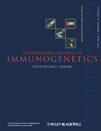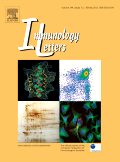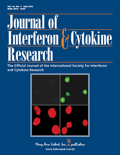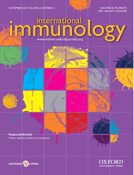
INTERNATIONAL JOURNAL OF IMMUNOPATHOLOGY AND PHARMACOLOGY
Scope & Guideline
Pioneering Insights in Immune Responses and Therapeutic Innovations.
Introduction
Aims and Scopes
- Immunological Mechanisms in Disease:
Research articles focusing on the role of the immune system in the pathogenesis of diseases, including autoimmune disorders, infections, and cancers. - Pharmacological Interventions:
Studies on the pharmacological agents that modulate immune responses, including immunosuppressants, biologics, and novel therapeutics. - Clinical Case Studies and Trials:
Reports on clinical cases and trials that provide insights into the effectiveness of immune-targeted therapies and their implications in patient management. - Translational Research:
Research that bridges basic immunology and clinical applications, aiming to translate laboratory findings into therapeutic strategies. - Genomic and Molecular Studies:
Investigations into genetic and molecular markers that influence immune responses and the efficacy of pharmacological treatments.
Trending and Emerging
- Immunotherapy and Novel Biologics:
An increasing number of studies focus on the development and clinical application of immunotherapies, including monoclonal antibodies and other biologics that manipulate immune pathways. - Inflammation and Immune Response Modulation:
Research exploring the modulation of inflammatory pathways and immune responses is gaining traction, particularly in the context of chronic diseases and novel therapeutics. - Genetic and Molecular Biomarkers:
A rise in studies investigating genetic polymorphisms and molecular markers that influence disease susceptibility and treatment responses, enhancing personalized medicine approaches. - Impact of COVID-19 on Immunology:
The ongoing research into the immune response to COVID-19 and its long-term implications on immunopathology is a significant emerging theme in recent publications. - Microbiome and Immune Interactions:
Exploratory studies examining the relationship between the microbiome and immune system dynamics, particularly how gut health influences systemic immune responses.
Declining or Waning
- Traditional Pharmacological Approaches:
There is a noticeable decline in studies centered around conventional pharmacological methods, as the focus shifts towards novel immunotherapies and targeted biologics. - Static Observational Studies:
The prevalence of purely observational studies without experimental or interventional components is decreasing, as the journal increasingly favors studies with active therapeutic implications. - Single Disease Focus:
Research concentrating on single diseases without consideration of broader immunological or pharmacological contexts is becoming less common, indicating a trend toward more integrative approaches.
Similar Journals

International Journal of Immunogenetics
Pioneering Research in Immune System GeneticsInternational Journal of Immunogenetics, under the esteemed publication house WILEY, serves as a pivotal platform for researchers and professionals in the fields of immunology and genetics. With an ISSN of 1744-3121 and an E-ISSN of 1744-313X, this journal offers a rich repository of scholarly articles and research findings that advance our understanding of immune system genetics. Hailing from the United Kingdom, the journal maintains an impactful presence with category quartiles reflecting a Q3 rating in Genetics and Immunology and a Q2 in Medicine (miscellaneous), positioning it as a credible source of scientific knowledge. It encompasses studies from converged years ranging from 1974 to 1996 and again from 2005 to 2024, ensuring a robust collection of both historical and contemporary research. Researchers are encouraged to engage with its content, given its Scopus rankings—highlighting the journal’s relevance in a competitive academic landscape. As an open-access title, International Journal of Immunogenetics strives to enhance accessibility to vital research, fostering collaboration and innovation in the genetic and immunological domains.

JOURNAL OF IMMUNOLOGY
Exploring Breakthroughs in Immune ScienceWelcome to the JOURNAL OF IMMUNOLOGY, a prestigious publication associated with the American Association of Immunologists and dedicated to advancing the field of immunology. With a rich history dating back to 1945, this journal is renowned for its high-impact research, evident in its notable 2023 Q1 rankings in both Immunology and Allergy, as well as its strong positions in Scopus rankings—Rank #68 in Immunology and Allergy and Rank #79 in Immunology and Microbiology. Although it operates on a subscription basis, its commitment to publishing cutting-edge studies ensures that it remains a vital resource for scientists, healthcare professionals, and students alike. As the journal continues to pave the way for innovative research and breakthroughs in immunological science, it facilitates a platform for dialogue and discovery among researchers and practitioners across the globe.

IMMUNOLOGY LETTERS
Fostering Collaboration Through Cutting-edge ResearchIMMUOLOGY LETTERS, published by Elsevier, is a distinguished journal in the field of immunology, focusing on the latest advancements and findings that significantly influence immunological research and clinical applications. Established in 1979, the journal has evolved to cater to a global readership, featuring high-quality peer-reviewed articles across a diverse spectrum of topics related to immunity and allergic responses. With an impressive Q2 category ranking in both Immunology and Allergy as of 2023, it holds a strong position within the scientific community, evidenced by its commendable Scopus rankings (Rank #71/233 in Medicine - Immunology and Allergy and Rank #85/236 in Immunology and Microbiology - Immunology). While primarily subscription-based, the journal aims to foster knowledge dissemination that encourages collaboration among researchers and practitioners alike, making significant contributions to the understanding of immune mechanisms. The journal is integral for educators, students, and professionals aiming to stay abreast of current trends and breakthroughs in the immune system's intricate functions.

SCANDINAVIAN JOURNAL OF IMMUNOLOGY
Pioneering Research at the Intersection of Immunology and MedicineScandinavian Journal of Immunology is a prestigious peer-reviewed journal published by Wiley, focused on the evolving field of immunology and its interdisciplinary ties with medicine. Since its inception in 1972, this journal has cultivated a rich repository of knowledge, showcasing innovative research and reviews that contribute to the understanding of immune system functions, disorders, and therapeutic interventions. With an impressive impact factor reflecting a Q2 ranking in Immunology and a top-tier Q1 status in miscellaneous Medicine categories for 2023, it is recognized for its high-quality scholarly output, positioning it among the leading journals in the field. Additionally, its Scopus ranking of #84 out of 236 in Immunology underscores its significance and relevance to both emerging and established researchers. Although it does not currently offer open access options, the journal’s expansive reach and rigorous publication standards make it an essential platform for disseminating impactful research to the global scientific community. The journal invites submissions that explore the complexities of the immune system, aiming to bridge clinical and basic science for a comprehensive understanding of immunological phenomena.

Immunity Inflammation and Disease
Unveiling cutting-edge research on immunity and inflammation.Immunity, Inflammation and Disease is a premier open-access journal published by WILEY, dedicated to advancing the field of immunology and allergy. Launched in 2013, this journal has established itself as a significant platform for researchers and professionals to disseminate high-quality research findings and innovative insights that address critical issues in immune responses and inflammatory diseases. With an impact factor that reflects its growing influence and a current ranking in Q3 for Immunology and Q2 for Immunology and Allergy, this journal serves a diverse audience keen on exploring cutting-edge developments. Researchers are encouraged to submit their work to share their findings with a global reach, foster collaboration, and enhance the understanding of immune mechanisms and therapeutic strategies. Accessible since its inception, Immunity, Inflammation and Disease is committed to open science, ensuring that vital research is freely available for the advancement of knowledge within the academic community and beyond.

HUMAN IMMUNOLOGY
Exploring Innovations in Immunity and AllergyHUMAN IMMUNOLOGY, published by Elsevier Science Inc, serves as a critical platform for disseminating research in the fields of immunology and allergy, as well as various aspects of miscellaneous medicine since its inception in 1980. With an ISSN of 0198-8859 and E-ISSN 1879-1166, this journal is pivotal for researchers and practitioners looking to advance their understanding of human immune responses and related conditions. The journal currently holds a respectable position within its field, as highlighted by its 2023 Scopus ranks—#114/233 in Immunology and Allergy and #132/236 in Immunology and Microbiology. Moreover, it maintains a Q2 quartile ranking in both Immunology and Allergy and miscellaneous Medicine, underscoring its influence and reach within the scientific community. Although it does not currently offer Open Access options, HUMAN IMMUNOLOGY remains dedicated to providing valuable insights and fostering academic discourse within its discipline, characterized by a rigorous peer-review process and a focus on innovative research trajectories.

Cellular & Molecular Immunology
Charting New Territories in Immunological ScienceCellular & Molecular Immunology is a prestigious peer-reviewed journal published by the CHIN SOCIETY IMMUNOLOGY. As a leading journal in the fields of immunology and infectious diseases, it proudly holds a Q1 designation across multiple categories, including Immunology, Allergy, and Medicine (Miscellaneous), reflecting its commitment to excellence and impactful research. With an ISSN of 1672-7681 and an E-ISSN of 2042-0226, the journal has been essential reading since its inception in 2004, continuously gathering insights from cutting-edge studies. It ranks impressively within Scopus, with positions in the 7th, 8th, and 9th percentile in relevant categories, establishing it as a cornerstone for researchers, clinicians, and students alike. The journal offers an extensive range of original research articles, reviews, and clinical studies, ensuring that readers stay at the forefront of immunological discovery. Whether you are interested in basic immunology, infectious diseases, or evolving therapies, Cellular & Molecular Immunology serves as an invaluable resource for advancing your knowledge and engagement in this dynamic field.

JOURNAL OF INTERFERON AND CYTOKINE RESEARCH
Connecting Research to Real-World Health SolutionsJOURNAL OF INTERFERON AND CYTOKINE RESEARCH, published by Mary Ann Liebert, Inc, stands out as a pivotal resource in the fields of immunology, virology, and cell biology, providing comprehensive insights into cytokine functions and their roles in immune responses. With ISSN 1079-9907 and E-ISSN 1557-7465, the journal aims to disseminate innovative research that advances our understanding of interferon and cytokine biology, a crucial aspect for developing therapeutic strategies against various diseases. Covering a broad scope of research from 1995 to 2024, it boasts a respectable impact factor within its category quartiles, ranking Q2 in Medicine (miscellaneous) and Q3 in the domains of Cell Biology, Immunology, and Virology as of 2023. While it does not provide open access options, the journal remains essential for academics, researchers, and professionals dedicated to exploring the complexities of immune signaling pathways and their implications for health and disease. The journal’s consistent contribution to scientific discourse underscores its importance in elevating query-driven studies to foster advancements in biomedical science.

Seminars in Immunopathology
Advancing Insights in Immunological ResearchSeminars in Immunopathology is a premier academic journal published by SPRINGER HEIDELBERG, focusing on the intricate relationships between immune responses and pathologies. With an ISSN of 1863-2297 and an E-ISSN of 1863-2300, this journal delivers cutting-edge research and insights to its readers, contributing significantly to the fields of immunology and allergy, as reflected in its Q1 quartile ranking in both categories for 2023. Positioned in a highly competitive niche, it ranks #18 out of 233 in Immunology and Allergy and #22 out of 236 in Immunology and Microbiology, highlighting its impact within the scientific community. Seminars in Immunopathology publishes comprehensive reviews and research articles, aiming to advance understanding of immune mechanisms in disease and promote interdisciplinary collaboration. Accessible from Germany, this journal is a vital resource for researchers, clinicians, and students seeking to stay at the forefront of immunological advancements and therapeutic innovations.

INTERNATIONAL IMMUNOLOGY
Elevating the Standards of Immunological Research Worldwide.INTERNATIONAL IMMUNOLOGY, published by OXFORD UNIV PRESS, stands out as a premier journal in the field of immunology, providing a vital platform for disseminating groundbreaking research and innovative developments within the discipline. With an impressive Q1 ranking in Immunology and Allergy, as well as in Medicine (miscellaneous), it consistently showcases high-impact studies that contribute to the advancement of immunological knowledge. The journal spans over three decades, from its inception in 1989 to its ongoing contributions as of 2024, thus solidifying its reputation in the scientific community. Researchers, professionals, and students will find valuable articles that delve into the complexities of immune responses, therapeutic interventions, and emerging immunological paradigms, ensuring INTERNATIONAL IMMUNOLOGY remains at the forefront of knowledge in the life sciences.